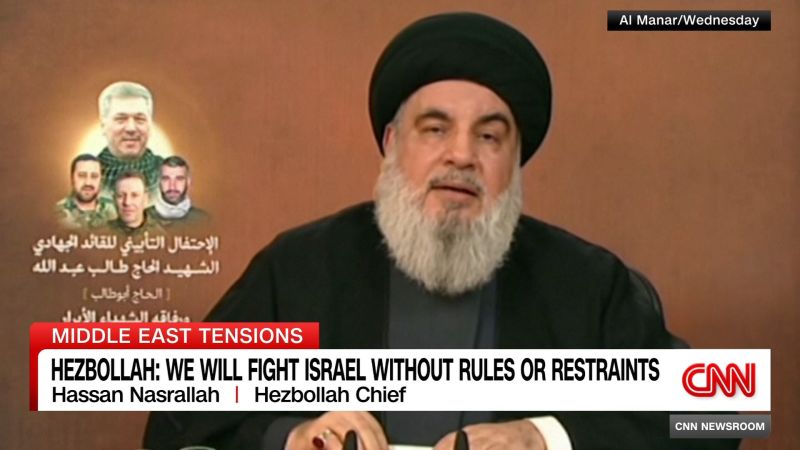CNN
—
In a heated speech on Wednesday, Hezbollah leader Hassan Nasrallah specifically attacked nearby Cyprus, threatening to attack the small Mediterranean island if it supported Israel in a possible war between the Lebanese militant group and Israel.
“Cyprus will also be part of this war” if it opens its airports and bases to Israeli forces, the leader of the Iran-backed militant group said in a televised address on Wednesday. A day earlier, Israel had warned that the prospect of a “total war” in Lebanon was “coming very close.”
Responding to the comments, Cypriot President Nikos Christodoulides denied involvement in the war.
“The statements are not pleasant, but they in no way correspond to what is being attempted, namely to create the impression that Cyprus is involved in the hostilities. In no way,” he said, adding that channels of communication with the Lebanese and Iranian governments were open.
While experts consider a war between Israel and Hezbollah unlikely, the mere mention of Cyprus adds a new dimension to the Israel-Gaza conflict. It risks dragging an EU country into a war that has already spread across the Middle East and putting Cyprus’s relations with Israel in the spotlight.
Here’s what we know:
As an island in the Eastern Mediterranean on a geopolitical fault line between the Middle East and Southern Europe, Cyprus is geographically much closer to the conflicts in the Middle East than to the European centers of power.
The island is twice the size of the US state of Delaware and consists of two parts: a Greek-speaking southern part known as the Republic of Cyprus and a Turkish-speaking region known as the Turkish Republic of Northern Cyprus. The island’s division reflects the rivalry between regional enemies Greece and Turkey. Most of the international community recognizes the sovereignty of only the Greek part of Cyprus, and it was against this country that Nasrallah’s threats were aimed.
The Republic of Cyprus is a member of the EU, but not of the NATO defence alliance, which obliges member states to come to each other’s aid in the event of an attack. About 920,000 people live in the Republic of Cyprus, and the capital is Nicosia.
Watch this interactive content on CNN.com
Diplomatic relations between Cyprus and Israel began in 1960, after the island’s independence from British colonial rule, but Cyprus did not open an embassy in Tel Aviv until 1994. In the 1980s and 1990s, relations deteriorated due to issues such as Israel’s close ties with Turkey and the Arab-Israeli conflict, in which Cyprus sided with the Arab states and supported a Palestinian state.
Relations recovered in the late 1990s and 2000s when Israel began to turn to the Eastern Mediterranean for economic partnerships, especially after the discovery of natural gas deposits in the region. According to experts, Israel has also viewed Cyprus as a partner to counter regional threats, primarily from Turkey and groups linked to Iran.
Israel has used Cypriot territory in recent years to train its troops for a possible war with Hezbollah. Cyprus’ terrain is similar to that of Lebanon, the Israel Defense Forces (IDF) said, according to Israeli media.
In 2022, the Israel Defense Forces conducted a joint military exercise with Cypriot forces. Part of the joint exercises focused on fighting on multiple fronts and concentrated on the fight against Hezbollah in Lebanon, Israeli media reported. Their last exercises took place in Cyprus in May 2023.
Stavros Ioannides/PIO/Reuters
Cypriot Foreign Minister Constantinos Kombos welcomes his Israeli counterpart Eli Cohen in Larnaca, Cyprus, on 20 December.
Cyprus strongly rejects all allegations of involvement in the Gaza war and points to its humanitarian efforts, through which some of the aid supplies reached Gaza.
“The Republic of Cyprus is not part of the problem. The Republic of Cyprus is part of the solution,” said President Christodoulides. “And our role in this, as demonstrated for example by the humanitarian corridor, is recognized not only by the Arab world but by the entire international community.”
In March, Cyprus allowed aid ships to leave its ports as part of international efforts to create a humanitarian sea route to Gaza.
The first shipment to Gaza contained 200 tonnes of food, equivalent to around 500,000 meals. An EU logistics centre has also been set up in Cyprus to facilitate the flow of aid to Gaza.
Nicosia criticized some of Israel’s actions in the Gaza Strip, particularly those that hindered the delivery of humanitarian aid.
In April, Israel issued a joint statement with the United Arab Emirates condemning the deadly Israeli attack on the World Central Kitchen charity that killed seven people.
Hamas was also repeatedly condemned for its attack on Israel on October 7.
Yiannis Kourtoglou/Reuters
Humanitarian aid for Gaza is loaded onto a platform next to a rescue ship belonging to the Spanish NGO Open Arms at the port of Larnaca, Cyprus, on March 11.
The island has been caught in the crossfire of regional conflicts before, a reminder of its proximity to the volatile Middle East. In 2019, a suspected Russian missile exploded over the Northern Cyprus region. Cypriot officials suspected the missile was linked to military operations in Syria and said it landed less than 15 miles north of the capital Nicosia.
A scenario in which Israel uses Cypriot bases for its forces, which Hezbollah has warned against, would “effectively expand the Gaza war to the European Union,” Mohammad Ali Shabani, Iran analyst and editor of Amwaj.media, wrote on X.
This would mean that for the first time an EU country would be directly involved in an expansion of the Gaza war.
However, some experts believe that there is little chance of an open war in the conflict between Israel and Hezbollah, as neither side wants such an escalation.
“Hezbollah’s release of drone footage of sensitive positions in Israel is intended to deter Israel,” Lina Khatib, associate fellow in the Middle East and North Africa program at London-based think tank Chatham House, told CNN, referring to the nine-minute drone video released by Hezbollah on Tuesday showing civilian and military positions in and around the Israeli city of Haifa.
“It is normal that both Israel and Hezbollah have military plans to deal with a possible escalation. But as things stand, neither Israel nor Hezbollah benefits from a full-scale war,” Khatib said, adding: “Hezbollah knows that a war with Israel would be devastating for Lebanon and that the country’s people have no interest in such a scenario.”
It is also unlikely that the Biden administration would let Israel fight a two-front war alone, she said, adding that U.S. involvement could “involve other Iran-backed actors and possibly target Iran itself.”
“This is a high price that Iran wants to avoid,” she said. “The United States also does not want to get into another Middle East quagmire, especially with the upcoming presidential election.”




